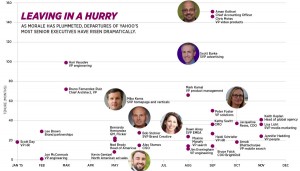— October 31, 2018

Alyibel / Pixabay
I’m going to tell you some secrets in this article about what it really takes to become a successful entrepreneur. Things you won’t read elsewhere. Things that make the difference between steady, solid growth and downright disaster.
Yep, that’s what is at stake, once you decide to go out on your own.
Entrepreneurs are made, not born. The making of the entrepreneur usually starts while the budding entrepreneur is working elsewhere, or involved in some sort of outside pursuit, such as a hobby or offering some services on the side that people are willing to pay for.
At some point, the budding entrepreneur decides that it’s time to go off on his or her own, and the adventure begins. When done right, it can be one of the most satisfying things you can do with your life. That’s what I want for you, which is why I’m sharing these secrets.
I’m going to divide this real-world advice—describing the characteristics of successful entrepreneurs—into five categories: Character, Customers, Infrastructure, Money, and Government.
Character: It matters most of all.
Business is a cooperative endeavor. Nice people make more money than jerks do, for the most part. Jerks don’t work well with others. They are anti-cooperators.
Jerks make for engrossing entertainment—almost everyone in business portrayed in movies are jerks—but in real life, the jerk ratio in most industries is very, very low. Even lawyers are nicer in real life.
This is assuming we are talking about legitimate, legal business. If you are doing something illegal, you can stop reading now; I’m not talking to you. You and your fellow jerks will not have a pleasant time of it, as you spend your life looking over your shoulder and wrestling with your conscience.
Most people who start businesses (these are the non-jerks) have looked around and thought, “People need this product or service. I can help,” and off they go. So they are naturally helpful. That’s a good start, but it’s not enough. You also have to be tough as nails while you are being helpful.
While business is about helping people, it’s also about being watchful and careful. It’s a jungle out there.
When you start a business, you become someone who “owns” something, which changes your status in the world. You need to see that and understand it, and make it part of your reality.
It’s about how you treat people, and how you expect people to treat you. For example, if you have a low opinion of yourself, you will undercharge and over trust. Some people will take advantage of you, and others will worry about your inability to lead. So be realistic about your talents, without being cocky (cockiness is the surest way to fail, in any business).
Make a point of dropping emotional baggage as soon as you realize it’s there. A friend might say something to you, or a customer might, and you will realize that you can improve your behavior in an area. Whatever it is, fix it, fast. Running a business is one of the fastest ways to grow up and become a well-balanced, calm, and wise adult.
Treat people as you wish you would be treated. Business is an exchange—of ideas, service, products, and money. Be fair, be honest, be squeaky clean in all your dealings. If a problem arises, face it immediately, admit fault (even if it wasn’t “you” but someone who worked for you—because they work for you, it is your fault). Never gossip, never play one person against another, never withhold information for your own gain.
Why is this important? Well, first, because if you do that, you will end up living a regret-free life, which is the best kind of life to live. In other words, you don’t want to be old someday and full of regrets. That really sucks. You want to get older knowing that you did the right and kind thing in all situations.
Second, if you do succeed, you will be serving as an example for others and quite literally giving hope to and inspiring others. If you do things that you regret, people will know it and you won’t be the shining example they were hoping you’d be. How many times have we seen someone in a position of power and admiration be “outed” for some sleazy behavior—such as abuse, cheating financially, or cheating on a spouse? It all falls apart, then, never to be recovered.
Third, you’re not fooling anyone, even in the little things. Being late and lying about why you were late; charging a bit more than you should; letting someone else take the blame for something . . . these are all little things, but they add up, and other people notice. People who buy things from you, and people who work with you or for you, want to be able to trust you. If they suspect that they can’t, they will find a way to stop interacting with you. It’s one of the most important traits of a successful entrepreneur: being someone that others can trust.
By the way, if you follow this advice, you will be a good manager. You will give your workers the support and leadership they need to get their work done. You will be kind and helpful, but also tough as nails when someone behaves in a way not in keeping with the “good guy” characteristics.
So yes, character matters most of all.
Customers: Without them, you don’t have a business
This seems obvious, but I’ve worked with hundreds of companies, from the single-owner companies to IBM, and every size of business in between.
As a revenue coach, the first thing I always did, after getting the “company” side of the story, was to interview their customers. And every single time—yes, every single time—the “company” view of customer needs and experiences was completely different than the customer’s view. Even if the company people interacted with customers all day long.
See, customers don’t tell you what they’re really thinking while they are buying from you. Instead, they are watching for those telltale character signs, and deciding if they can trust you or even if you care.
Example: When they call, do they get “press one for this and two for that, and if we don’t give you an option you want, tough?” Or, do the choices give them a way, for example, to talk to a human immediately? Or, better yet, does a human being answer the phone on the first ring?
It is easier than you think, even as a sole entrepreneur, to take your eyes off the prize, and get swallowed up by the other aspects of the business—building the product, creating systems, working with others, dealing with complex governmental regulations, doing accounting and marketing and sales and fulfillment, fixing things that break, and on and on. You can work from dawn to the wee hours of the morning without interacting with—and focusing on—customers.
Plus, the assumptions you make about them and their desires come out of your own experience. But people buy things for very specific and often subtle reasons, based on their own experience. For example, others in your industry may have made and broken certain promises, over and over again (“User-friendly!” “Simple to use!” “No assembly required!”), which means that when you show up, they’re already burned and skeptical.
And, they can have the strangest or least-obvious reasons for buying certain things. Only by interviewing customers who have already bought from you (notice I did not say “surveying”—surveys come from your head, not theirs) can you find out what those reasons are. My book goes into great detail on how to do this.
Don’t guess, it’s fatal. I guarantee that at this moment, someone is looking for you and can’t find you (because you don’t understand how they’d look for you and you haven’t done what you should to make sure you’re found that way), or they have found you and have decided, without even talking to you, that they don’t want to buy from you. Those are sales you should and could have made, if you understood what your customers really wanted from you and how they wanted to buy from you.
Infrastructure: You’re only as good as your apps.
Apps are where it’s at now. The software industry has grown up enough to be creating functional software that actually works (mostly) the way you do, instead of forcing you to change how you work to accommodate the software. “There’s an app for that!” is what you should be thinking.
However, your apps are only as good as your systems and the way you think about and organize your work. For example, of course you want your apps to streamline your work processes, subtracting the steps needed for any process. But you also have to be realistic about what still might need to be done by a human being.
I read recently that Amazon accounted for something like 70 percent of all retail sales during the Christmas season of 2017. Why am I bringing this up here? Because, when Amazon first emerged, I thought to myself, “Hmmm. Interesting. This is the first time a tech company made the infrastructure their focus, not their product.” Yes, Amazon started out selling books. But it wasn’t the books that made them successful; it was their ability to make it easy for the customer to buy. They made promises—1-click ordering; Amazon Prime; reviews and suggestions by other customers; see what other people looked at; etc.—and they delivered.
Business is now very, very competitive. It’s easier than ever to start a business, no matter where you are or what you do. That bar is much, much lower than it used to be.
But.
Customer expectations are also way, way higher than they used to be. If you sell online, you are automatically selling against the customer expectations set by Amazon. Whatever you’re selling, whatever you’re promising (and selling is nothing more than promises), you better be able to deliver, or you will forever be fighting your own, well-earned negative reputation.
That’s the other thing that has changed. Any customer who has bought from you has plenty of opportunity to tell others to steer clear.
Your systems will really be terrible if you don’t start learning how to create good ones. You can use a program such as LucidChart to create flow charts of processes; always diagram them, even if it’s on a whiteboard in your office or your iPad (GoodNotes is great for hand-drawn diagrams). Look at them, think about where they are getting bogged down. Start with what the customer expects and work backwards.
Whatever system you create, it should be flexible and transparent. You should be able to look at it and see what’s going on, in seconds, without a lot of digging, so you can make good decisions based on what you see. And, if something in a system—or the system itself—isn’t working well, you need to get really aggressive about changing it for the better.
You can promise great stuff to customers all day, but if your systems aren’t working, you won’t be able to deliver.
Keep up with the latest applications; watch what others in your business are doing; constantly be looking for new ways to automate and streamline your business. I have never, ever regretted investing wisely—but somewhat aggressively—on the tools necessary to make the business run smoothly. It pays.
Money: Make more than you spend.
I’m sure some of you newbies are rolling your eyes right now, saying, “Well, duh!” But anyone who has been in business more than six months knows that it is ridiculously easy to spend more than you’re bringing in.
Businesses need to be built. Most of what you will do will be supported by software, probably cloud-based, subscription applications. Those costs add up. Then there are the people whose work supports the infrastructure, not directly related to the product or service that you offer. And all the other overhead you need—computers, office equipment, that sort of thing.
In the first heady flush of excitement starting a business, it’s easy to get carried away with spending, using a credit card or your savings or a loan. This is when you need to be very, very careful.
Instead, your goal is to literally be profitable from day one. Sounds crazy, but it is possible; I’ve done it several times. And yes, it depends on the type of business you’re starting. But thinking “I have to be profitable from day one” forces you to make sure you have income before you start spending.
Another goal: Take 15 – 20 percent of every single check you get and put it into savings. Don’t worry, you’ll survive on the remaining 80 – 85 percent.
That is the sure way to make sure that when something bad happens—and it will—you will be able to get through it. You should make sure you have at least two months of operating money in a separate savings account or money market fund, at all times. Cash flow can be a really big problem. And there are always those pesky tax payments that come due, and you need money to pay them. Which brings us to The Government.
Government: Too complex, too arbitrary, too powerful to deal with on your own.
The problem with regulations is they can be changed at the whim of the regulators, leaving you, in many cases, with the sudden realization that you’re in trouble—even if you have always done everything above board and have followed all the rules.
At the very least, hire a decent accountant. Pay attention to basic trends, and keep asking the accountant how this might affect your business. And for goodness sake, every single time you interact with a government official of any type, “get it in writing.”
If you mail your tax payments, send them by certified mail. If you get advice from someone in the government, have them send it to you in an email or a letter. I say this because they can, and do, change the rules, and can come back to you and say, “Oh, yes, that’s true that we gave that advice to everyone two years ago. But it’s changed now. Did you get it in writing?”
One changed regulation can put you out of business, say, if they change a sales tax law and require that you pay back taxes for the last three years because you didn’t get it in writing.
And never try to cheat the government. It’s not worth it. It’s so much better to stand in front of an auditor with a clear conscience, knowing that they may find some honest mistakes but no intentional deception.
______
That’s enough advice to keep you out of the most debilitating traps. Best of luck to you, I commend you for striking out on your own. It takes guts. But it will also be one of the most rewarding things you have ever done.
Business & Finance Articles on Business 2 Community
(38)






